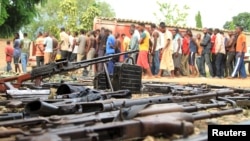The African Union has authorized deployment of peacekeepers to troubled Burundi and given the government a four-day deadline to accept the troops.
A communique issued Friday by the AU Peace and Security Council said the peacekeeping force would have up to 5,000 soldiers and police. It authorized the deployment for an initial period of six months.
The council condemned recent violence in Burundi, including attacks on military barracks in the capital last week that reportedly left 87 people dead.
The communique said the AU would not allow Burundi to descend into widespread violence that could affect the wider region.
There was no immediate response from the government in Bujumbura, which has said previously that the central African country does not need peacekeepers.
Burundi has experienced eight months of violence and unrest following the announcement that President Pierre Nkurunziza is seeking a third term — a move his critics say is unconstitutional.
The president was re-elected in July in a vote boycotted by the opposition.
AU demands talks
The AU has demanded the government hold talks with opposition leaders, mediated by the East African Community, to resolve the crisis. In its statement Friday, the council said that "only a genuine and truly inclusive dialogue ... will allow the Burundian stakeholders to overcome the serious difficulties facing their country."
The U.S. special envoy to Africa's Great Lakes Region, Thomas Perriello, attended a vigil for victims of the violence outside the White House in Washington on Thursday night, immediately after returning from a trip to Burundi.
He told VOA's Central African service that in Burundi he could feel a "palpable sense of fear or concern" on the streets, but he was hopeful the situation could be resolved.
"I think you see across the region and across the world a much greater sense of needing to come together to solve this thing — that the fears of a civil war are very real, we still have time to stop it, and the people of Burundi still want to get back to that decade of progress of post-conflict reconciliation," Perriello said.
Burundi is still emerging from a 12-year civil war ending in 2005 that killed about 300,000 people.
On Thursday, the United Nations' top human rights official warned that Burundi was on a trajectory back to its "horrendously violent past" that must be countered by the international community.
Zeid Ra'ad Al Hussein said more than 400 people have been killed since protests against the president began in April. More than 200,000 Burundians have fled to neighboring countries.




